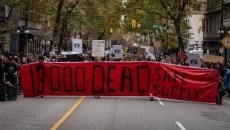Hikes to oil production and rebounding air travel put a drag on Canada's climate progress last year, a report published Thursday by a leading policy institute found, though the country was still able to make a modest cut to its planet-warming emissions.
The new estimates from the Canadian Climate Institute show Canada cut emissions by about 0.8 cent last year compared to 2022, or eight per cent since 2005.
But the report said the country will need to speed up that progress if it hopes to hit its 2030 target to cut emissions by 40 to 45 per cent compared to 2005 levels.
"Sustained policy effort in the electricity sector demonstrate that significant progress is achievable, but other sectors need to follow suit and accelerate their momentum to keep Canada on track," it said.
Industrial carbon pricing and coal phaseouts were cited as two policies helping to drive the electricity sector's decarbonization efforts, with emissions falling 6.2 per cent year-over-year, or 62 per cent since 2005.
"What we've been able to do in electricity is nothing short of astounding, and it continues in this year's estimate," said Dave Sawyer, the institute's principal economist.
Emissions from buildings also dropped six per cent, the report said, largely attributable to lower natural gas heating demands during Canada's warmest winter on record.
The entire year was also the second warmest on record in Canada and the warmest globally, driven by climate change and boosted by El Niño conditions.
Of the eight major sectors, the report said transport saw the biggest annual increase, rising by about 1.6 per cent, driven by a major rebound in domestic aviation.
Oil and gas continued to hold back Canada's progress, continuing its long-standing trend of annual emissions increases. Sector emissions were up about one per cent over 2022 or 12 per cent since 2005, driven by higher production.
The sector now accounts for just under a third of the country's total emissions.
“Once again, progress in Canada’s emissions reductions is starkly different across sectors," said Canadian Climate Institute president Rick Smith.
"Governments right across the country need to accelerate developing policy and strengthen measures already in place, like electrification and industrial carbon pricing systems.”
The early estimates don’t offer a look at what policies are driving emissions progress. Yet, a previous report, published by the institute in March, suggested industrial carbon pricing had the biggest impact, and could help drive up to nearly half of Canada's climate-policy driven emissions cuts by 2030.
That same report found the consumer carbon price was responsible for about eight to 14 per cent of expected emissions reductions.
The institute's early estimates are intended to offer a high-level snapshot of emissions trends before Canada releases its official inventory report next spring, a requirement under United Nations climate pacts. The independent early estimates are based in part on annual Statistics Canada data on production, demand and demographic activity.
While a growing population and economy helped drive up emissions, it was more than offset by climate policy and changing markets, the report said, including from clean energy advances.
Yet, the report noted the uptake in clean energy is still off pace. While electricity emissions are way down, the demand for electricity has not significantly increased, suggesting a slow electrification switch.
“We're seeing electricity flat, demand flat, in fact, and so most of the reductions are coming from fuel switching – coal to gas, for example. So, fossil to fossil,” said Sawyer, the economist.
“This is an indicator we're going to be watching more closely.”






